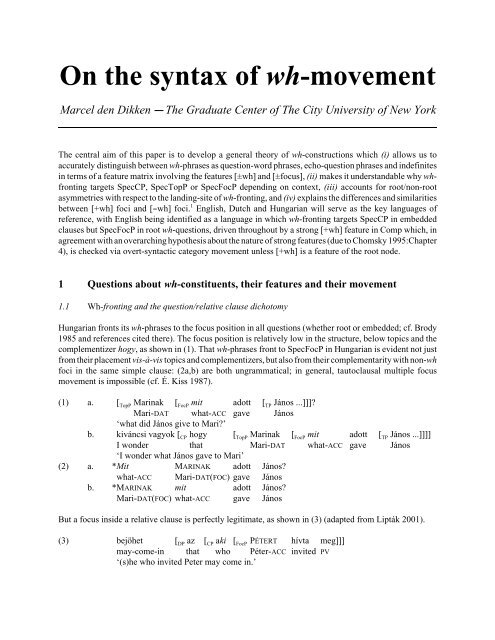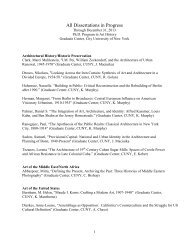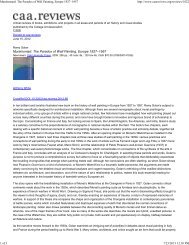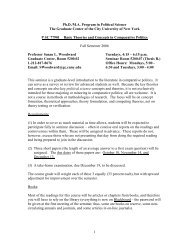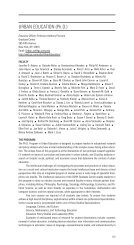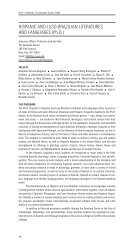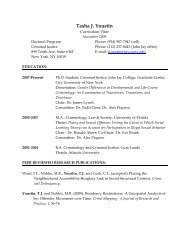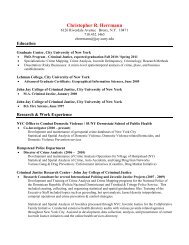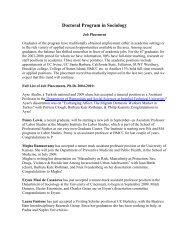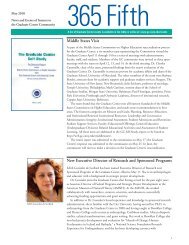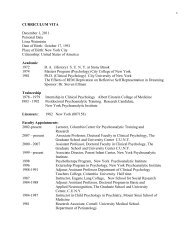On the syntax of wh-movement - CiteSeerX
On the syntax of wh-movement - CiteSeerX
On the syntax of wh-movement - CiteSeerX
You also want an ePaper? Increase the reach of your titles
YUMPU automatically turns print PDFs into web optimized ePapers that Google loves.
<strong>On</strong> <strong>the</strong> <strong>syntax</strong> <strong>of</strong> <strong>wh</strong>-<strong>movement</strong><br />
Marcel den Dikken & The Graduate Center <strong>of</strong> The City University <strong>of</strong> New York<br />
The central aim <strong>of</strong> this paper is to develop a general <strong>the</strong>ory <strong>of</strong> <strong>wh</strong>-constructions <strong>wh</strong>ich (i) allows us to<br />
accurately distinguish between <strong>wh</strong>-phrases as question-word phrases, echo-question phrases and indefinites<br />
in terms <strong>of</strong> a feature matrix involving <strong>the</strong> features [±<strong>wh</strong>] and [±focus], (ii) makes it understandable <strong>wh</strong>y <strong>wh</strong>fronting<br />
targets SpecCP, SpecTopP or SpecFocP depending on context, (iii) accounts for root/non-root<br />
asymmetries with respect to <strong>the</strong> landing-site <strong>of</strong> <strong>wh</strong>-fronting, and (iv) explains <strong>the</strong> differences and similarities<br />
between [+<strong>wh</strong>] foci and [%<strong>wh</strong>] foci. 1 English, Dutch and Hungarian will serve as <strong>the</strong> key languages <strong>of</strong><br />
reference, with English being identified as a language in <strong>wh</strong>ich <strong>wh</strong>-fronting targets SpecCP in embedded<br />
clauses but SpecFocP in root <strong>wh</strong>-questions, driven throughout by a strong [+<strong>wh</strong>] feature in Comp <strong>wh</strong>ich, in<br />
agreement with an overarching hypo<strong>the</strong>sis about <strong>the</strong> nature <strong>of</strong> strong features (due to Chomsky 1995:Chapter<br />
4), is checked via overt-syntactic category <strong>movement</strong> unless [+<strong>wh</strong>] is a feature <strong>of</strong> <strong>the</strong> root node.<br />
1 Questions about <strong>wh</strong>-constituents, <strong>the</strong>ir features and <strong>the</strong>ir <strong>movement</strong><br />
1.1 Wh-fronting and <strong>the</strong> question/relative clause dichotomy<br />
Hungarian fronts its <strong>wh</strong>-phrases to <strong>the</strong> focus position in all questions (<strong>wh</strong>e<strong>the</strong>r root or embedded; cf. Brody<br />
1985 and references cited <strong>the</strong>re). The focus position is relatively low in <strong>the</strong> structure, below topics and <strong>the</strong><br />
complementizer hogy, as shown in (1). That <strong>wh</strong>-phrases front to SpecFocP in Hungarian is evident not just<br />
from <strong>the</strong>ir placement vis-à-vis topics and complementizers, but also from <strong>the</strong>ir complementarity with non-<strong>wh</strong><br />
foci in <strong>the</strong> same simple clause: (2a,b) are both ungrammatical; in general, tautoclausal multiple focus<br />
<strong>movement</strong> is impossible (cf. É. Kiss 1987).<br />
(1) a. [ TopP Marinak [ FocP mit adott [ TP János ...]]]?<br />
Mari-DAT <strong>wh</strong>at-ACC gave János<br />
‘<strong>wh</strong>at did János give to Mari?’<br />
b. kiváncsi vagyok [ CP hogy [ TopP Marinak [ FocP mit adott [ TP János ...]]]]<br />
I wonder that Mari-DAT <strong>wh</strong>at-ACC gave János<br />
‘I wonder <strong>wh</strong>at János gave to Mari’<br />
(2) a. *Mit MARINAK adott János?<br />
<strong>wh</strong>at-ACC Mari-DAT(FOC) gave János<br />
b. *MARINAK mit adott János?<br />
Mari-DAT(FOC) <strong>wh</strong>at-ACC gave János<br />
But a focus inside a relative clause is perfectly legitimate, as shown in (3) (adapted from Lipták 2001).<br />
(3) bejöhet [ DP az [ CP aki [ FocP PÉTERT hívta meg]]]<br />
may-come-in that <strong>wh</strong>o Péter-ACC invited PV<br />
‘(s)he <strong>wh</strong>o invited Peter may come in.’
Marcel den Dikken & <strong>On</strong> <strong>the</strong> <strong>syntax</strong> <strong>of</strong> <strong>wh</strong>-<strong>movement</strong> 2<br />
So <strong>wh</strong>-relative pronouns do not front to SpecFocP. The way to state <strong>the</strong> difference between <strong>wh</strong>-relative<br />
pronouns and <strong>wh</strong>-question words is that <strong>the</strong> latter have a [+focus] feature <strong>wh</strong>ile <strong>the</strong> former do not. What <strong>the</strong>y<br />
share in common is <strong>the</strong>ir possession <strong>of</strong> <strong>the</strong> morphological feature [+<strong>wh</strong>]. But <strong>the</strong> morphological feature<br />
[+<strong>wh</strong>] does not systematically cause <strong>wh</strong>-fronting in Hungarian. So here we have our first question:<br />
(Q1) <strong>wh</strong>y does [+<strong>wh</strong>] drive <strong>wh</strong>-fronting in relative clauses but not in questions in Hungarian?<br />
1.2 Wh-types and <strong>the</strong> distribution <strong>of</strong> <strong>the</strong> morphological feature [+<strong>wh</strong>]<br />
The morphological feature [+<strong>wh</strong>] is common to <strong>the</strong> entire class <strong>of</strong> <strong>wh</strong>-constituents, simply as a reflex <strong>of</strong> <strong>the</strong>ir<br />
<strong>wh</strong>-morphology. This class also includes <strong>wh</strong>-constituents used as indefinites, and <strong>wh</strong>-phrases in echo<br />
questions. Dutch is a language that is particularly suitable for <strong>the</strong> illustration <strong>of</strong> all <strong>the</strong>se types:<br />
(4) a. wat is er gebeurd?<br />
<strong>wh</strong>at is <strong>the</strong>re happened<br />
‘<strong>wh</strong>at happened?’<br />
b. er is wat gebeurd<br />
<strong>the</strong>re is <strong>wh</strong>at happened<br />
‘something happened.’<br />
c. is er wat gebeurd?<br />
is <strong>the</strong>re <strong>wh</strong>at happened<br />
‘did something happen?’<br />
d. er is WAT gebeurd?!<br />
<strong>the</strong>re is <strong>wh</strong>at happened<br />
‘WHAT happened?!’<br />
e. wat er is gebeurd, is onduidelijk<br />
<strong>wh</strong>at <strong>the</strong>re is happened is unclear<br />
‘<strong>wh</strong>at happened is unclear’<br />
f. wanneer is er wat/WAT gebeurd?<br />
<strong>wh</strong>en is <strong>the</strong>re <strong>wh</strong>at happened<br />
‘<strong>wh</strong>en did something/WHAT happen?’, but not *‘<strong>wh</strong>at happened <strong>wh</strong>en?’<br />
g. gisteren is er *wat/WAT gebeurd?<br />
yesterday is <strong>the</strong>re <strong>wh</strong>at happened<br />
All <strong>of</strong> <strong>the</strong>se examples feature <strong>the</strong> word wat, <strong>the</strong> Dutch cognate <strong>of</strong> English <strong>wh</strong>at. In Dutch (as in German, but<br />
unlike in English), this <strong>wh</strong>-word doubles as an indefinite pronoun, meaning something like ‘something’ (cf.<br />
e.g. Postma 1994 and Bennis 1995 for discussion). But regardless <strong>of</strong> <strong>wh</strong>e<strong>the</strong>r it is semantically interpreted<br />
as a question word or as an indefinite pronoun, its morphological composition is invariant. Put differently,<br />
if (as is standardly assumed) wat qua question word has <strong>the</strong> morphological feature [+<strong>wh</strong>], <strong>the</strong>n wat qua<br />
indefinite pronoun has this feature as well. And since it is specifically <strong>the</strong> morphological features <strong>of</strong><br />
linguistic elements (and only those features) <strong>wh</strong>ich are <strong>the</strong> driving force for <strong>movement</strong> (cf. Chomsky<br />
1995:197: ‘all morphological features must be checked some<strong>wh</strong>ere, for convergence’), we now face our<br />
second question:<br />
(Q2) <strong>wh</strong>y do <strong>wh</strong>-indefinites and echo-<strong>wh</strong>’s fail to undergo <strong>wh</strong>-<strong>movement</strong>?
Marcel den Dikken & <strong>On</strong> <strong>the</strong> <strong>syntax</strong> <strong>of</strong> <strong>wh</strong>-<strong>movement</strong> 3<br />
The paradigm in (4) tells us that it is not <strong>the</strong> case that morphologically [+<strong>wh</strong>]-marked constituents<br />
must <strong>wh</strong>-front & not even in simple questions (cf. (4c)%(4d)). Nor is it <strong>the</strong> case that <strong>wh</strong>-fronting, <strong>wh</strong>enever<br />
it does take place, categorically affects <strong>the</strong> closest morphologically [+<strong>wh</strong>]-marked constituent & (4f), <strong>wh</strong>ile<br />
(predictably) impossible on a multiple question interpretation (‘<strong>wh</strong>at happened <strong>wh</strong>en?’), is perfect on a<br />
reading in <strong>wh</strong>ich wat is interpreted as an indefinite or an echo-question word. This leads us to a third<br />
question:<br />
(Q3) <strong>wh</strong>at counts as <strong>the</strong> closest possessor <strong>of</strong> [+<strong>wh</strong>] <strong>wh</strong>en it comes to <strong>wh</strong>-fronting?<br />
Skeptics <strong>of</strong> a [+<strong>wh</strong>]-based approach to <strong>wh</strong>-<strong>movement</strong> might conclude at this point that this is<br />
sufficient evidence to give up on that kind <strong>of</strong> analysis altoge<strong>the</strong>r, and instead blame <strong>wh</strong>-fronting on a<br />
‘question feature’ in C. But apart from <strong>the</strong> fact that such a feature would not in any obvious sense qualify<br />
as a morphological feature, an analysis <strong>of</strong> <strong>wh</strong>-<strong>movement</strong> along <strong>the</strong>se lines would fail to countenance <strong>the</strong> fact<br />
that <strong>wh</strong>-fronting does not just take place in questions & relative clauses feature it, too (cf. (3) and (4e)).<br />
Moreover, <strong>the</strong> position to <strong>the</strong> left <strong>of</strong> <strong>the</strong> finite verb in a question is strictly reserved for constituents that are<br />
morphologically [+<strong>wh</strong>]-marked (cf. (4g) vs (4f)). So <strong>the</strong>re is good evidence that <strong>the</strong> [+<strong>wh</strong>] feature plays a<br />
key role in <strong>wh</strong>-<strong>movement</strong>, but a sweeping statement to <strong>the</strong> effect that C attracts <strong>the</strong> closest [+<strong>wh</strong>]-marked<br />
constituent to its specifier would be much too crude.<br />
1.3 Structural complexity and inertia<br />
What we need to find is an intelligent way <strong>of</strong> preventing [+<strong>wh</strong>] indefinite pronouns and echo-question words<br />
from being attracted by <strong>the</strong> [+<strong>wh</strong>] feature <strong>of</strong> <strong>the</strong> probe. To say, as does Lipták (2001), that <strong>the</strong> [+<strong>wh</strong>] feature<br />
is not a feature <strong>of</strong> <strong>the</strong> <strong>wh</strong>-word itself but is introduced by a Q%marker added onto <strong>wh</strong>-words used as question<br />
words, seems to me not to be <strong>the</strong> right move to make: plainly, <strong>the</strong> [+<strong>wh</strong>]-morphology is a part <strong>of</strong> <strong>the</strong> <strong>wh</strong>-word<br />
itself, not <strong>of</strong> <strong>the</strong> Q%marker; moreover, it is unclear how such an approach would make <strong>the</strong> desired distinction<br />
between ‘true’ question words and echo-<strong>wh</strong>’s.<br />
A more plausible approach would be to say that <strong>the</strong> syntactic structure <strong>of</strong> indefinite ‘<strong>wh</strong>at’ and echo-<br />
‘<strong>wh</strong>at’ is complex, such that <strong>the</strong> [+<strong>wh</strong>] feature <strong>of</strong> <strong>the</strong> <strong>wh</strong>-word is too deeply embedded in <strong>the</strong>m to be visible<br />
by an outside head. More technically, that feature would be embedded inside <strong>the</strong> DP phase, not visible ‘on<br />
<strong>the</strong> edge.’ For indefinite ‘<strong>wh</strong>at’ such is altoge<strong>the</strong>r reasonable, in <strong>the</strong> light <strong>of</strong> <strong>the</strong> overt complexity <strong>of</strong> German<br />
(5a,b) and Hungarian (5c):<br />
(5) a. et+was<br />
ET+<strong>wh</strong>at, i.e. ‘something’<br />
b. irgend+wo<br />
some+<strong>wh</strong>ere<br />
c. vala+mi<br />
VALA+<strong>wh</strong>at, i.e. ‘something’<br />
If for echo-‘<strong>wh</strong>at’ we can likewise uphold a syntactically complex representation in <strong>wh</strong>ich ‘<strong>wh</strong>at’ is<br />
embedded, we get <strong>the</strong> desired result that <strong>the</strong> [+<strong>wh</strong>] feature <strong>of</strong> <strong>the</strong> probe is perfectly capable <strong>of</strong> attracting a<br />
[+<strong>wh</strong>] question word across a [+<strong>wh</strong>]-marked indefinite pronoun or echo-‘<strong>wh</strong>at’: though wat in (4f) is closer<br />
to <strong>the</strong> probe than wanneer ‘<strong>wh</strong>en’, and wat possesses a [+<strong>wh</strong>] feature, it none<strong>the</strong>less fails to interfere with<br />
<strong>the</strong> attraction <strong>of</strong> wanneer by <strong>the</strong> probe, simply because <strong>of</strong> <strong>the</strong> fact that wat’s [+<strong>wh</strong>] feature is too deeply<br />
buried inside <strong>the</strong> complex noun phrase <strong>of</strong> <strong>wh</strong>ich it is a part for <strong>the</strong> probe to be able to see it.<br />
This, in essence, is <strong>the</strong> answer to question (Q2). And <strong>the</strong> answer to (Q3) is obviously related to it: <strong>the</strong><br />
closest attractee is <strong>the</strong> closest <strong>wh</strong>-phrase that has a [+<strong>wh</strong>] feature <strong>wh</strong>ich C can ‘see’.
Marcel den Dikken & <strong>On</strong> <strong>the</strong> <strong>syntax</strong> <strong>of</strong> <strong>wh</strong>-<strong>movement</strong> 4<br />
1.4 Echoes and multiple questions<br />
In Den Dikken & Giannakidou (to appear), a syntactically complex analysis <strong>of</strong> echo-<strong>wh</strong>’s is defended on<br />
<strong>the</strong> basis <strong>of</strong> <strong>the</strong> fact that multiple <strong>wh</strong>-questions <strong>wh</strong>ich normally receive a regular pair-list interpretation can<br />
only get a single-pair echoic reading <strong>wh</strong>en <strong>the</strong> fronted <strong>wh</strong>-constituent is a <strong>wh</strong>-<strong>the</strong>-hell expression:<br />
(6) a. <strong>wh</strong>o is in love with <strong>wh</strong>o? [pair-list OR single-pair echo interpretation]<br />
b.<br />
?<br />
<strong>wh</strong>o <strong>the</strong> hell is in love with <strong>wh</strong>o? [single-pair echo interpretation ONLY (marginal)]<br />
The essence <strong>of</strong> <strong>the</strong> account <strong>of</strong> (6b) outlined in Den Dikken & Giannakidou (to appear) is this. Who <strong>the</strong> hell<br />
is a polarity item, <strong>wh</strong>ich in (6b) needs to be licensed under c-command by <strong>the</strong> Q%operator in <strong>the</strong> matrix C.<br />
Such will succeed only if <strong>wh</strong>o <strong>the</strong> hell raises to a position lower than SpecCP & in <strong>the</strong> light <strong>of</strong> Hungarian<br />
(1), SpecFocP would be an obvious choice. But (2) tells us that <strong>wh</strong>-fronting to SpecFocP is incompatible with<br />
focus on some o<strong>the</strong>r constituent in <strong>the</strong> same clause. Now, in situ <strong>wh</strong>-constituents are always focused, hence<br />
need to be licensed in SpecFocP. So no matter <strong>wh</strong>at we do in (6b), it seems that things will go awry: if we<br />
take <strong>the</strong> in situ <strong>wh</strong> to SpecFocP, we have no choice but to take <strong>wh</strong>o <strong>the</strong> hell to SpecCP, <strong>wh</strong>ere it will not be<br />
able to be licensed by Q in C; but if we take <strong>wh</strong>o <strong>the</strong> hell to SpecFocP and accomplish its licensing as a PI,<br />
we will not be able to license <strong>the</strong> focus feature <strong>of</strong> <strong>the</strong> in situ <strong>wh</strong>-constituent. This is <strong>wh</strong>y (6b) lacks a gardenvariety<br />
pair-list interpretation.<br />
An echoic single-pair reading is none<strong>the</strong>less available, and here is how it is obtained. The idea is that<br />
echo-<strong>wh</strong>’s have a syntactically complex representation featuring a Q%morpheme and a <strong>wh</strong>-phrase. It is <strong>the</strong><br />
Q%morpheme <strong>wh</strong>ich is solely responsible for <strong>the</strong> fact that simple echo questions like John said WHAT?<br />
receive a question interpretation: in simple echo questions such as this, <strong>the</strong>re is no Q%operator up in C (cf.<br />
<strong>the</strong> ban on PI licensing in simple echo questions: *John said WHAT to anyone?), so <strong>the</strong> entire burden <strong>of</strong><br />
procuring an interrogative interpretation rests on <strong>the</strong> shoulders <strong>of</strong> <strong>the</strong> echo-<strong>wh</strong> itself. Now, <strong>the</strong> idea developed<br />
in Den Dikken & Giannakidou (to appear) is that a <strong>wh</strong>-phrase equipped with this Q%morpheme can team up<br />
with ano<strong>the</strong>r <strong>wh</strong>-phrase in SpecFocP and form a single pair <strong>of</strong> <strong>wh</strong>-expressions toge<strong>the</strong>r with it & <strong>the</strong> result<br />
being a single-pair echo question, precisely <strong>the</strong> kind <strong>of</strong> creature that (6b) instantiates.<br />
In questions <strong>of</strong> <strong>the</strong> type in (6b), <strong>the</strong>n, both <strong>wh</strong>-phrases are in SpecFocP & nei<strong>the</strong>r is fronted to<br />
SpecCP. <strong>On</strong> <strong>the</strong> non-echoic pair-list interpretation <strong>of</strong> (6a), on <strong>the</strong> o<strong>the</strong>r hand, <strong>the</strong> in situ <strong>wh</strong> is uniquely<br />
associated with focus, <strong>the</strong> superior <strong>wh</strong>-phrase raising higher. So here we have yet ano<strong>the</strong>r question:<br />
(Q4) <strong>wh</strong>y do question-<strong>wh</strong>’s front to SpecFocP in some contexts and to a higher position in o<strong>the</strong>rs,<br />
within <strong>the</strong> same language and within <strong>the</strong> same type <strong>of</strong> clause?<br />
1.5 A root/non-root asymmetry<br />
We can compound <strong>the</strong> conundrum by drawing attention to a root/non-root asymmetry that asserts itself in<br />
<strong>the</strong> domain <strong>of</strong> <strong>wh</strong>-fronting in English: as Pesetsky (1989) notes, topics (<strong>wh</strong>ose position is relatively constant<br />
cross-linguistically) precede <strong>wh</strong>-fronted constituents in root questions but follow <strong>the</strong>m in embedded ones:<br />
(7) a.<br />
b.<br />
?<br />
to Mary, <strong>wh</strong>at should we give?<br />
?<br />
I don’t know <strong>wh</strong>at to Mary, we should give<br />
If we do indeed assume that to Mary is in <strong>the</strong> same position in (7a,b), <strong>the</strong>n <strong>the</strong>se examples tell us that <strong>the</strong><br />
landing-site <strong>of</strong> <strong>wh</strong>-<strong>movement</strong> in English is different in root and embedded clauses, <strong>wh</strong>ich leads us to<br />
formulate <strong>the</strong> following question:
Marcel den Dikken & <strong>On</strong> <strong>the</strong> <strong>syntax</strong> <strong>of</strong> <strong>wh</strong>-<strong>movement</strong> 5<br />
(Q5) <strong>wh</strong>y do question-<strong>wh</strong>’s front to SpecCP in embedded <strong>wh</strong>-questions but to SpecFocP (modulo<br />
pair-list <strong>wh</strong>-questions like (6a)) in root <strong>wh</strong>-questions, in some languages?<br />
Since (Q5) is <strong>the</strong> last question on <strong>the</strong> checklist that I will address in this paper, we can now take a step back<br />
and start working our way towards answers to <strong>the</strong>se fundamental questions.<br />
1.6 The feature composition <strong>of</strong> <strong>wh</strong>-constituents<br />
<strong>On</strong>e thing we have established in <strong>the</strong> discussion so far is that a <strong>syntax</strong> <strong>of</strong> <strong>wh</strong>-<strong>movement</strong> <strong>wh</strong>ich puts <strong>the</strong> blame<br />
on <strong>the</strong> morphological feature [+<strong>wh</strong>] can be made to ‘overlook’ indefinite and echoic bearers <strong>of</strong> <strong>the</strong> feature<br />
such that it successfully picks out precisely <strong>the</strong> desired victims, <strong>wh</strong>ile a <strong>syntax</strong> <strong>of</strong> <strong>wh</strong>-<strong>movement</strong> phrased in<br />
terms <strong>of</strong> a C%head with a ‘question feature’ in it will not only fail to be consistent with <strong>the</strong> minimalist dictum<br />
that only morphological features drive <strong>movement</strong> but will also leave relative clauses by <strong>the</strong> wayside.<br />
For <strong>the</strong> feature composition <strong>of</strong> <strong>wh</strong>-constituents, this discussion leads to <strong>the</strong> following typology:<br />
(8) a. regular question words (single questions) [+WH, +FOC]<br />
b. echo-question words [+WH, +FOC] [+WH] not attractable<br />
c. indefinite <strong>wh</strong>-words [+WH, &FOC] [+WH] not attractable<br />
d. relative <strong>wh</strong>-words [+WH, &FOC]<br />
Of <strong>the</strong>se four <strong>wh</strong>-word types, only (8a,b) are attractable to <strong>the</strong> focus position, and only (8a,d) are attractable<br />
by a [+<strong>wh</strong>] feature in C. This already tells us <strong>wh</strong>y echo-<strong>wh</strong>’s and indefinite <strong>wh</strong>’s will not undergo <strong>wh</strong>fronting<br />
(in <strong>the</strong> strict sense <strong>of</strong> that term), and <strong>wh</strong>y <strong>the</strong>y will not ‘count’ as closer potential attractees/goals<br />
for attraction to [+<strong>wh</strong>] C <strong>wh</strong>en <strong>the</strong>y intervene between it and a question-<strong>wh</strong> lower down. But it does not tell<br />
us yet <strong>wh</strong>y <strong>wh</strong>-fronting <strong>of</strong> relative <strong>wh</strong>’s always targets SpecCP, cross-linguistically; and it also does not have<br />
anything to say so far about <strong>the</strong> questions raised with respect to language-particular and clause-particular<br />
peculiarities <strong>of</strong> <strong>movement</strong> operations affecting regular question words. So we still have a long road ahead<br />
<strong>of</strong> us. Let me first sketch out a little map <strong>of</strong> that road, before we get started.<br />
1.7 Road map<br />
In <strong>wh</strong>at follows, <strong>the</strong> first thing I will do is argue that in all (non-echo) questions in all languages, <strong>the</strong>re is a<br />
[+<strong>wh</strong>] feature up in C. This is <strong>the</strong> topic <strong>of</strong> section 2. In section 3, I will subsequently address <strong>the</strong> root/nonroot<br />
asymmetry seen in section 1.5, from <strong>the</strong> perspective <strong>of</strong> <strong>the</strong> question <strong>of</strong> <strong>the</strong> strength <strong>of</strong> <strong>the</strong> [+<strong>wh</strong>] feature<br />
in C and <strong>wh</strong>at its strength means <strong>wh</strong>en it comes to overt feature-checking <strong>movement</strong>. Section 4 <strong>the</strong>n<br />
addresses <strong>the</strong> question <strong>of</strong> <strong>wh</strong>y <strong>the</strong>re is no language variation <strong>wh</strong>en it comes to <strong>the</strong> <strong>movement</strong> <strong>of</strong> <strong>wh</strong>constituents<br />
in relative clauses. Some residual questions will finally be discussed in section 5.<br />
2 Attraction to Focus and [+<strong>wh</strong>] Comp<br />
The C%head <strong>of</strong> a ‘true’ (i.e., non-echoic) <strong>wh</strong>-question has a [+<strong>wh</strong>] feature. That [+<strong>wh</strong>] feature does not end<br />
up attracting <strong>the</strong> <strong>wh</strong>-constituent up to its specifier position in English root single <strong>wh</strong>-questions (cf. (7a)),<br />
though it does in embedded <strong>wh</strong>-questions as well as in pair-list multiple <strong>wh</strong>-questions (cf. section 3), or in<br />
Hungarian <strong>wh</strong>-questions in general (cf. (1)%(2)). But <strong>the</strong>re is evidence none<strong>the</strong>less that <strong>the</strong>re is indeed a<br />
[+<strong>wh</strong>] feature up in C in such questions, and that that feature does indeed get checked against <strong>the</strong> [+<strong>wh</strong>]<br />
feature <strong>of</strong> <strong>the</strong> question word, via feature <strong>movement</strong> at LF. The evidence in question comes from an
Marcel den Dikken & <strong>On</strong> <strong>the</strong> <strong>syntax</strong> <strong>of</strong> <strong>wh</strong>-<strong>movement</strong> 6<br />
interesting intervention effect in Hungarian <strong>wh</strong>-questions, recently discussed in Lipták (2001), from <strong>wh</strong>ich<br />
source all <strong>the</strong> Hungarian data in section 2.1 are taken. After going through Lipták’s argument based on<br />
Hungarian, I will <strong>the</strong>n proceed, in sections 2.2 to 2.5, to discussing English attraction to focus against <strong>the</strong><br />
background <strong>of</strong> <strong>the</strong> results <strong>of</strong> section 2.1.<br />
2.1 Covert feature <strong>movement</strong> to [+<strong>wh</strong>] Comp & An intervention effect<br />
There is no doubt that <strong>wh</strong>-phrases front to SpecFocP in Hungarian <strong>wh</strong>-questions. They end up in precisely<br />
<strong>the</strong> same position <strong>wh</strong>ich non-<strong>wh</strong> foci occupy, and <strong>the</strong>y are in complementary distribution with non-<strong>wh</strong> foci<br />
(cf. (2)), in keeping with <strong>the</strong> general fact that multiple focus <strong>movement</strong> is impossible (cf. É. Kiss 1987).<br />
However, <strong>the</strong>re is one peculiar way in <strong>wh</strong>ich <strong>wh</strong>-foci behave differently from non-<strong>wh</strong> foci: <strong>wh</strong>ile <strong>the</strong> latter<br />
are perfectly happy with a quantificational adverb to <strong>the</strong>ir left (as in (9a), <strong>wh</strong>ere <strong>the</strong> adverb scopes over <strong>the</strong><br />
focus), <strong>wh</strong>-foci cannot be preceded by such adverbs (cf. (10a)).<br />
(9) a. mindig PÉTERT hívtam meg<br />
always Péter-ACC invited PV<br />
‘at all times, I invited PÉTER’<br />
b. PÉTERT hívtam meg mindig<br />
Péter-ACC invited PV always<br />
‘Péter was <strong>the</strong> only one I invited all <strong>the</strong> time’<br />
(10) a. *mindig kit hívtál meg?<br />
always <strong>wh</strong>o-ACC invited PV<br />
b. kit hívtál meg mindig?<br />
<strong>wh</strong>o-ACC invited PV always<br />
‘<strong>wh</strong>o did you invite all <strong>the</strong> time?’<br />
To account for <strong>the</strong> deviance <strong>of</strong> (10a), Lipták (2001:81) <strong>of</strong>fers <strong>the</strong> interesting proposal that <strong>the</strong> construction<br />
instantiates an intervention effect <strong>of</strong> <strong>the</strong> type discussed by Beck (1996), and more recently & and, crucially,<br />
with reference to LF feature <strong>movement</strong> & by Pesetsky (2000) as well. In particular, Lipták postulates a<br />
structure <strong>of</strong> <strong>the</strong> type in (11) for (10a), with mindig sitting in <strong>the</strong> specifier position <strong>of</strong> a Distributive Phrase<br />
(for distributive quantifiers; cf. Beghelli & Stowell 1997), harmfully intervening between <strong>the</strong> [+<strong>wh</strong>] feature<br />
in <strong>the</strong> probe, C, and its target, <strong>the</strong> [+<strong>wh</strong>] feature <strong>of</strong> <strong>the</strong> <strong>wh</strong>-phrase in SpecFocP.<br />
(11) *[ CP C [ DistP mindig [Dist [ FocP kit [Foc hívtál [ TP pro ... meg ...]]]]]]<br />
We know from <strong>the</strong> literature that intervention effects are specific to <strong>movement</strong> dependencies. So [+<strong>wh</strong>] C<br />
attracts <strong>the</strong> <strong>wh</strong>-constituent in SpecFocP. It clearly does not attract <strong>the</strong> <strong>wh</strong>-constituent in overt <strong>syntax</strong>,<br />
however: <strong>the</strong>re is no category <strong>movement</strong> <strong>of</strong> <strong>the</strong> <strong>wh</strong>-phrase beyond SpecFocP. We are dealing, <strong>the</strong>refore, with<br />
a case <strong>of</strong> covert feature <strong>movement</strong>, instigated by C’s desire to get its uninterpretable [+<strong>wh</strong>] feature checked.<br />
Feature <strong>movement</strong> will succeed if and only if <strong>the</strong>re are no harmful interveners on <strong>the</strong> trajectory between <strong>the</strong><br />
probe and <strong>the</strong> goal; since <strong>the</strong> quantificational adverb mindig is such a harmful intervener, however, feature<br />
<strong>movement</strong> fails, <strong>the</strong> uninterpretable [+<strong>wh</strong>] feature <strong>of</strong> C cannot be checked, and <strong>the</strong> derivation crashes, as<br />
desired.<br />
The ungrammaticality <strong>of</strong> (10a), so construed, thus presents evidence for <strong>the</strong> presence <strong>of</strong> a [+<strong>wh</strong>]<br />
feature in C in ‘true’ <strong>wh</strong>-questions & a feature <strong>wh</strong>ich must be able to attract <strong>the</strong> [+<strong>wh</strong>] feature <strong>of</strong> <strong>the</strong> <strong>wh</strong>constituent<br />
in SpecFocP. In (11) this fails, <strong>wh</strong>ich is <strong>wh</strong>y (10a) is ungrammatical.
Marcel den Dikken & <strong>On</strong> <strong>the</strong> <strong>syntax</strong> <strong>of</strong> <strong>wh</strong>-<strong>movement</strong> 7<br />
2.2 Attraction to focus in English<br />
We can exploit Lipták’s account <strong>of</strong> <strong>the</strong> ungrammaticality <strong>of</strong> (10a) to account for <strong>the</strong> word order facts <strong>of</strong><br />
English constructions featuring attraction to focus. Recall from <strong>the</strong> above (also cf. Den Dikken &<br />
Giannakidou, to appear) that <strong>the</strong>re is evidence that English <strong>wh</strong>-phrases front to SpecFocP in root single <strong>wh</strong>questions<br />
like (7a). Attraction to focus is evidently overt here: <strong>the</strong> <strong>wh</strong>-constituent ends up in <strong>the</strong> left<br />
periphery <strong>of</strong> <strong>the</strong> clause.<br />
For English non-<strong>wh</strong> foci, Kayne (1998) has argued recently that displacement to SpecFocP is overt<br />
as well. Yet, non-<strong>wh</strong> foci do not, as a rule, end up in a left-peripheral position in <strong>the</strong> sentence & in (12a), it<br />
looks like <strong>the</strong> focused noun phrase is in situ. <strong>On</strong> <strong>the</strong> basis <strong>of</strong> such contrasts as <strong>the</strong> one between (12a) and<br />
(12b), however, Kayne argues that <strong>the</strong> focused constituent has indeed moved in overt <strong>syntax</strong>, <strong>the</strong> fact that<br />
it does not surface at <strong>the</strong> left edge <strong>of</strong> <strong>the</strong> sentence being due, according to Kayne, to overt remnant <strong>movement</strong><br />
<strong>of</strong> <strong>the</strong> TP across <strong>the</strong> landing-site <strong>of</strong> <strong>the</strong> focused constituent, to <strong>the</strong> specifier position <strong>of</strong> <strong>wh</strong>at he calls ‘WP’.<br />
Kayne’s derivation <strong>of</strong> (12a) is illustrated in (13).<br />
(12) a. I spoke only to JOHN.<br />
b. *I spoke to only JOHN.<br />
(13) a. [ FocP [ PP to JOHN] i [ Foc only [ TP I spoke t i]]] 6 remnant TP fronting + raising <strong>of</strong> only 6<br />
b. [ WP [ TP I spoke t i] j [ W only k [ FocP [ PP to JOHN] i [ Foc t k [ TP t j]]]]]<br />
The contrast between (12a) and (12b) will now follow on <strong>the</strong> assumption that <strong>movement</strong> to SpecFocP cannot<br />
strand a preposition & (12b) could only be obtained by raising <strong>the</strong> focused noun phrase to SpecFocP on its<br />
own, leaving <strong>the</strong> preposition to behind, <strong>wh</strong>ich would <strong>the</strong>n be taken along to a position to <strong>the</strong> left <strong>of</strong> <strong>the</strong><br />
constituent in SpecFocP as a result <strong>of</strong> remnant <strong>movement</strong> <strong>of</strong> <strong>the</strong> TP (I spoke to).<br />
Kayne shows that a variety <strong>of</strong> restrictions on <strong>the</strong> placement <strong>of</strong> focus particles like only can be<br />
insightfully accounted for on <strong>the</strong> assumption that focus <strong>movement</strong> happens in <strong>the</strong> overt <strong>syntax</strong>, its word order<br />
effects largely being undone by fronting <strong>of</strong> <strong>the</strong> remnant TP to a position to <strong>the</strong> left <strong>of</strong> <strong>the</strong> focus position. So<br />
let us take Kayne’s analysis <strong>of</strong> English focus to support <strong>the</strong> idea that focus <strong>movement</strong> is overt in this<br />
language. Then <strong>the</strong> hypo<strong>the</strong>sis that <strong>wh</strong>-phrases undergo overt-syntactic focus <strong>movement</strong> to SpecFocP in<br />
English root questions becomes a subpart <strong>of</strong> a general approach to focus in terms <strong>of</strong> overt displacement.<br />
2.3 No remnant IP fronting in ‘true’ <strong>wh</strong>-questions & Ano<strong>the</strong>r intervention effect<br />
But <strong>of</strong> course <strong>the</strong>re is a difference between (12a) and a <strong>wh</strong>-question like <strong>wh</strong>o did John kiss? & <strong>the</strong> focus in<br />
(12), despite <strong>the</strong> fact that it is overtly fronted to SpecFocP, still ends up in clause-final position, due to <strong>the</strong><br />
fact that both IP and only (Foc 0 ) raise across it. Applying <strong>the</strong> same operations in a situation in <strong>wh</strong>ich our<br />
focus is a <strong>wh</strong>-phrase will not deliver a regular <strong>wh</strong>-question but an echo question like John kissed WHO?<br />
instead. In a ‘true’ <strong>wh</strong>-question, remnant TP%fronting to SpecWP is apparently impossible.<br />
Taking <strong>the</strong> discussion in section 2.1 as my cue, I would like to argue that this is so because attraction<br />
<strong>of</strong> <strong>the</strong> [+<strong>wh</strong>] feature <strong>of</strong> <strong>the</strong> <strong>wh</strong>-constituent in SpecFocP by [+<strong>wh</strong>] in C would fail in a situation in <strong>wh</strong>ich <strong>the</strong><br />
remnant TP fronts to SpecWP, across <strong>the</strong> landing-site <strong>of</strong> <strong>the</strong> focused <strong>wh</strong>-phrase:<br />
(14) *[ CP C [ WP TP j [W [ FocP <strong>wh</strong>-phrase [Foc [ TP t j]]]]]]<br />
The configuration in (14) is exactly like <strong>the</strong> one in (11): once again, something intervenes between <strong>the</strong> probe<br />
and <strong>the</strong> goal; and that something (i.e., TP) is once again quantificational (on <strong>the</strong> assumption that tense<br />
involves a temporal operator), hence counts as a harmful intervener. Thus, (14) poses <strong>the</strong> same kind <strong>of</strong><br />
intervention problem that we found in (11).
Marcel den Dikken & <strong>On</strong> <strong>the</strong> <strong>syntax</strong> <strong>of</strong> <strong>wh</strong>-<strong>movement</strong> 8<br />
2.4 No ban on remnant IP fronting in echo and multiple questions<br />
We now have an account <strong>of</strong> <strong>the</strong> fact that, even though <strong>the</strong> remnant TP usually raises across a fronted focus<br />
in English, it cannot do so <strong>wh</strong>en <strong>the</strong> focus is a <strong>wh</strong>-phrase in a ‘true’ question. In echo questions, by contrast,<br />
<strong>the</strong> TP can raise across <strong>the</strong> echo-<strong>wh</strong> in SpecFocP & in echo questions, C does not possess a [+<strong>wh</strong>] feature (<strong>the</strong><br />
[+<strong>wh</strong>] feature <strong>of</strong> C is <strong>the</strong> prerogative <strong>of</strong> ‘true’ questions), and no intervention effect will arise.<br />
In multiple <strong>wh</strong>-questions, we also see no ban on remnant TP fronting to SpecWP: <strong>the</strong> in situ <strong>wh</strong>phrase<br />
in (6a) (repeated here) is <strong>the</strong> focus <strong>of</strong> <strong>the</strong> construction, but it does not show up at <strong>the</strong> left periphery<br />
<strong>of</strong> <strong>the</strong> sentence; it behaves just like a non-<strong>wh</strong> ‘in situ’ focus such as <strong>the</strong> one seen in (12a). A partial derivation<br />
<strong>of</strong> (6a) thus reads as in (15), <strong>wh</strong>ich is parallel to (13).<br />
¡<br />
¢ ¢<br />
(6a) <strong>wh</strong>o is in love with <strong>wh</strong>o?<br />
(15) a.<br />
b.<br />
[ FocP [ PP with WHO] i [ Foc i [ IP <strong>wh</strong>o is in love ti]]] 6 remnant TP fronting + raising <strong>of</strong> i 6<br />
[ WP [ TP <strong>wh</strong>o is in love ti] j [ W ik [ FocP [ PP with WHO] i [ Foc tk [ IP tj]]]]] There would be an ‘intervention effect’ for <strong>the</strong> checking <strong>of</strong> <strong>the</strong> [+<strong>wh</strong>] feature <strong>of</strong> C (<strong>wh</strong>ich is introduced<br />
outside WP) here, as in (14), if <strong>the</strong> ‘in situ’ <strong>wh</strong>-phrase (i.e., <strong>the</strong> one in SpecFocP) were <strong>the</strong> only one that<br />
could check this [+<strong>wh</strong>] feature. But <strong>of</strong> course, in a multiple <strong>wh</strong>-question <strong>the</strong>re will always be at least one <strong>wh</strong>phrase<br />
in addition to <strong>the</strong> one in SpecFocP <strong>wh</strong>ich possesses a [+<strong>wh</strong>] feature, and <strong>wh</strong>ich is structurally closer<br />
to <strong>the</strong> <strong>wh</strong>-phrase raised to SpecFocP: in (6a)/(15), <strong>the</strong> pertinent <strong>wh</strong>-phrase is <strong>the</strong> subject-<strong>wh</strong>, sitting in SpecTP<br />
in (15). It is this <strong>wh</strong>-phrase <strong>wh</strong>ich will eventually take care <strong>of</strong> <strong>the</strong> checking <strong>of</strong> C’s [+<strong>wh</strong>] feature. The <strong>wh</strong>phrase<br />
in SpecFocP (<strong>wh</strong>ich, alongside its focus feature, does <strong>of</strong> course possess <strong>the</strong> morphological feature<br />
[+<strong>wh</strong>] as well) does not get its [+<strong>wh</strong>] feature checked against <strong>the</strong> [+<strong>wh</strong>] feature <strong>of</strong> C at all & it couldn’t, for<br />
exactly <strong>the</strong> same reason that checking <strong>the</strong> [+<strong>wh</strong>] features <strong>of</strong> C and <strong>the</strong> focused <strong>wh</strong>-phrase fails in (14). <strong>On</strong>e<br />
thing that <strong>the</strong> discussion up to this point allows us to establish, <strong>the</strong>n, is that it is not <strong>the</strong> [+<strong>wh</strong>] features <strong>of</strong><br />
individual <strong>wh</strong>-phrases that are in need <strong>of</strong> checking; on <strong>the</strong> contrary, it is <strong>the</strong> features <strong>of</strong> functional heads that<br />
drive checking. This is precisely <strong>wh</strong>at <strong>the</strong> ‘suicidal Greed’ approach <strong>of</strong> Chomsky (1998) leads us to expect.<br />
What we have here, <strong>the</strong>n, is an indication that ‘Greed’ is false, and ‘suicidal Greed’ (or ‘attract’) is correct.<br />
2.5 Overt attraction to Comp<br />
The derivation in (15), for <strong>the</strong> sentence in (6a), is only partial; beyond this point, <strong>the</strong> ‘superior’ <strong>wh</strong>-phrase<br />
will still need to get <strong>the</strong> [+<strong>wh</strong>] feature <strong>of</strong> Comp checked. No harmful intervener finds itself between <strong>the</strong> two,<br />
however, so <strong>the</strong> checking <strong>of</strong> <strong>the</strong> [+<strong>wh</strong>] feature <strong>of</strong> Comp will proceed unobstructed by an intervention effect.<br />
But note that <strong>the</strong> possessor <strong>of</strong> <strong>the</strong> [+<strong>wh</strong>] feature <strong>wh</strong>ich will be checked against that <strong>of</strong> C finds itself in <strong>the</strong><br />
specifier position <strong>of</strong> <strong>the</strong> specifier <strong>of</strong> WP. And this raises a question with respect to how [+<strong>wh</strong>] C can<br />
successfully attract this matching feature.<br />
From <strong>the</strong> literature on restrictions on syntactic head <strong>movement</strong> (cf. Baker 1988, Hale & Keyser<br />
1993), we are familiar with <strong>the</strong> fact that it is generally impossible to incorporate <strong>the</strong> head <strong>of</strong> a specifier into<br />
some higher head. The Barriers <strong>the</strong>ory may provide an account for this (as Hale & Keyser 1993 argue);<br />
Chomsky’s (1999) recent ‘derivation by phase’ model (<strong>wh</strong>ich in a way is a reinstatement <strong>of</strong> <strong>the</strong> bounding<br />
<strong>the</strong>ory lost in earlier incarnations <strong>of</strong> minimalism) may yield <strong>the</strong> same result: <strong>the</strong> head <strong>of</strong> <strong>the</strong> specifier cannot<br />
be ‘on <strong>the</strong> edge’ <strong>of</strong> a phase. The specifier itself is at <strong>the</strong> edge, however. Translated into consequences for<br />
attraction and <strong>the</strong> category-<strong>movement</strong>/feature-<strong>movement</strong> dichotomy, <strong>wh</strong>at this implies is that in contexts <strong>of</strong><br />
<strong>the</strong> type in (15b), only <strong>the</strong> <strong>wh</strong>-phrase in SpecTP as a <strong>wh</strong>ole will be attractable by [+<strong>wh</strong>] in C; attraction <strong>of</strong><br />
just <strong>the</strong> feature fails as a result <strong>of</strong> <strong>the</strong> fact that <strong>the</strong> feature is too deeply embedded, invisible to <strong>the</strong> probe.
Marcel den Dikken & <strong>On</strong> <strong>the</strong> <strong>syntax</strong> <strong>of</strong> <strong>wh</strong>-<strong>movement</strong> 9<br />
This in turn implies that, regardless <strong>of</strong> <strong>the</strong> ‘strength’ properties <strong>of</strong> <strong>the</strong> [+<strong>wh</strong>] feature up in C, <strong>the</strong><br />
‘superior’ <strong>wh</strong>-phrase in a pair-list multiple <strong>wh</strong>-question must undergo phrasal <strong>movement</strong> to a position<br />
outside WP. Two options now remain, in principle: (i) <strong>the</strong> <strong>wh</strong>-phrase can raise directly to SpecCP and check<br />
C’s [+<strong>wh</strong>] feature under Spec%Head agreement, or (ii) <strong>the</strong> <strong>wh</strong>-phrase can raise to a topic position (SpecTopP)<br />
between C and WP, with <strong>wh</strong>’s [+<strong>wh</strong>] subsequently being attracted up to C under covert feature <strong>movement</strong>.<br />
In Hungarian, (ii) is precisely <strong>wh</strong>at happens: in a multiple <strong>wh</strong>-question, <strong>wh</strong>at would correspond to <strong>the</strong> ‘in<br />
situ’ <strong>wh</strong>-phrase in English raises to SpecFocP, <strong>the</strong> o<strong>the</strong>r <strong>wh</strong>(’s) raising to SpecTopP:<br />
(16) kiváncsi vagyok [ CP hogy [ TopP ki [ FocP mit [ IP ... vett ...]]]]<br />
I wonder that <strong>wh</strong>o <strong>wh</strong>at-ACC bought<br />
‘I wonder <strong>wh</strong>o bought <strong>wh</strong>at’<br />
For an English root multiple <strong>wh</strong>-question such as (6a), it looks like <strong>the</strong> ‘superior’ <strong>wh</strong> likewise fronts<br />
to SpecTopP ra<strong>the</strong>r than all <strong>the</strong> way to SpecCP. We can take <strong>the</strong> placement <strong>of</strong> <strong>the</strong> ‘superior’ <strong>wh</strong> vis-à-vis<br />
non-<strong>wh</strong> topics as our cue here: as Pesetsky (1989) pointed out, in a root single <strong>wh</strong>-question, <strong>the</strong> <strong>wh</strong>-phrase<br />
follows <strong>the</strong> topic (cf. (7a)); likewise, in a root multiple <strong>wh</strong>-question <strong>the</strong> topic will precede <strong>the</strong> ‘superior’ <strong>wh</strong>phrase:<br />
(17) a.<br />
??<br />
to Mary, <strong>wh</strong>o should give <strong>wh</strong>at?<br />
b. *<strong>wh</strong>o, to Mary, should give <strong>wh</strong>at?<br />
The result in (17a) is strained, but it is still markedly better than (17b), <strong>wh</strong>ich would result if <strong>the</strong> ‘superior’<br />
<strong>wh</strong> fronted overtly to SpecCP in a root multiple <strong>wh</strong>-question in English. We conclude, <strong>the</strong>refore, that option<br />
(ii) is correct, for Hungarian as well as English.<br />
For (6b), <strong>wh</strong>ich features a <strong>wh</strong>-<strong>the</strong>-hell ‘superior’ <strong>wh</strong>-phrase, option (ii) is ruled out on account <strong>of</strong> <strong>the</strong><br />
fact that <strong>wh</strong>-<strong>the</strong>-hell, due to its quantificational properties, does not qualify as a possible topic. So only<br />
option (i) would remain; but <strong>of</strong> course, a derivation along <strong>the</strong>se lines will crash as well, since raising <strong>wh</strong>-<strong>the</strong>hell<br />
to <strong>the</strong> SpecCP position <strong>of</strong> <strong>the</strong> root clause will take it outside <strong>the</strong> c-command domain <strong>of</strong> its licenser, <strong>the</strong><br />
Q%operator in C. Tertium non datur & in particular, it is impossible to leave <strong>the</strong> <strong>wh</strong>-phrase in situ in SpecTP<br />
and to have its [+<strong>wh</strong>] attracted by [+<strong>wh</strong>] C at LF. If such were legitimate, we would fail to explain <strong>the</strong><br />
unavailability <strong>of</strong> a pair-list interpretation for (6b); but as we have just seen, <strong>the</strong>re are in fact good reasons<br />
to believe that such is not legitimate.<br />
The account thus ensures that in English root multiple <strong>wh</strong>-questions <strong>the</strong>re will always be overt<br />
fronting <strong>of</strong> <strong>the</strong> ‘superior’ <strong>wh</strong>-phrase to a position outside WP (<strong>the</strong> landing-site <strong>of</strong> <strong>the</strong> fronted remnant TP).<br />
We have derived this result from a <strong>the</strong>ory centred on <strong>the</strong> checking <strong>of</strong> <strong>the</strong> [+<strong>wh</strong>] feature <strong>of</strong> Comp & a <strong>the</strong>ory<br />
<strong>wh</strong>ich answers (Q4), accommodates <strong>the</strong> unavailability <strong>of</strong> a pair-list answer for (6b), explains <strong>wh</strong>y remnant<br />
IP fronting to Kayne’s SpecWP is possible in echo and multiple questions but not in single ‘true’ <strong>wh</strong>questions<br />
featuring <strong>wh</strong>-fronting to SpecFocP, and derives <strong>the</strong> ungrammaticality <strong>of</strong> Hungarian (10a).<br />
3 The root/non-root asymmetry revisited<br />
We have found that <strong>the</strong>re is good evidence that <strong>the</strong>re is a [+<strong>wh</strong>] feature on C that checks a matching feature<br />
against a <strong>wh</strong>-question word. We have also found that <strong>wh</strong>-question words systematically check that feature<br />
covertly in English root single questions. So far, <strong>the</strong>n, all <strong>the</strong> evidence suggests that, just as in Hungarian,<br />
<strong>the</strong> [+<strong>wh</strong>] feature <strong>of</strong> English C is weak. But in English embedded clauses, <strong>wh</strong>-fronting proceeds all <strong>the</strong> way<br />
up to SpecCP & <strong>the</strong> word order contrast in (7a,b) is a particularly clear indicator to that effect.
Marcel den Dikken & <strong>On</strong> <strong>the</strong> <strong>syntax</strong> <strong>of</strong> <strong>wh</strong>-<strong>movement</strong> 10<br />
So now we made our way back to question (Q5): Why is <strong>the</strong>re this asymmetry between root and<br />
embedded questions <strong>wh</strong>en it comes to <strong>the</strong> point in <strong>the</strong> derivation (pre- or post-Spell-Out) at <strong>wh</strong>ich <strong>the</strong> [+<strong>wh</strong>]<br />
feature <strong>of</strong> interrogative C is checked? More specifically, <strong>wh</strong>y does <strong>the</strong> [+<strong>wh</strong>] feature <strong>of</strong> C drive overtsyntactic<br />
<strong>wh</strong>-<strong>movement</strong> to SpecCP in English only in non-root contexts, not <strong>wh</strong>en it is a feature <strong>of</strong> <strong>the</strong> root<br />
node?<br />
The answer to this question is actually quite simple, if we base ourselves on Chomsky’s (1995:234)<br />
characterization <strong>of</strong> <strong>the</strong> nature <strong>of</strong> strong features. For Chomsky, <strong>the</strong> hallmark <strong>of</strong> a strong feature is <strong>the</strong><br />
following (<strong>wh</strong>ere ‘D’ is ‘derivation’, and ‘"’ is a category with a strong feature):<br />
(18) ‘D is canceled if " is in a category not headed by "’<br />
A violation <strong>of</strong> (18) can never arise in cases in <strong>wh</strong>ich <strong>the</strong> strong feature is on <strong>the</strong> root node itself: <strong>the</strong>re will<br />
never be any category not headed by " in such cases. The idea is that <strong>the</strong> strong features <strong>of</strong> a head H must<br />
be checked prior to <strong>the</strong> point in <strong>the</strong> derivation at <strong>wh</strong>ich H gets included in a larger structure <strong>of</strong> <strong>wh</strong>ich H is<br />
no longer <strong>the</strong> head; but <strong>of</strong> course, if H is <strong>the</strong> head <strong>of</strong> <strong>the</strong> root node, its projection will never be dominated<br />
by any larger superstructure, and nothing will ever force even <strong>the</strong> strong features <strong>of</strong> H to be checked in <strong>the</strong><br />
overt <strong>syntax</strong>. And since overt displacement is never permissible unless forced (‘least effort’), Chomsky’s<br />
outlook on strong features guarantees straightforwardly that no strong feature <strong>of</strong> <strong>the</strong> root C will ever be<br />
checked via overt displacement.<br />
For English, <strong>the</strong>n, <strong>wh</strong>at we can say is that <strong>the</strong> [+<strong>wh</strong>] feature <strong>of</strong> C is strong (throughout), <strong>wh</strong>ich<br />
results in overt-syntactic <strong>wh</strong>-<strong>movement</strong> in all contexts except <strong>the</strong> root CP:<br />
(19) a. <strong>the</strong> [+<strong>wh</strong>] feature <strong>of</strong> English interrogative C is strong<br />
b. overt category <strong>movement</strong> to SpecCP is forced by (18) in all English interrogative CPs,<br />
except in root CPs, <strong>wh</strong>ere (18) is inoperative<br />
For Hungarian (and Chinese etc.), <strong>the</strong> situation is different: <strong>the</strong> [+<strong>wh</strong>] feature on C <strong>the</strong>re is weak, hence we<br />
get no <strong>wh</strong>-displacement in overt <strong>syntax</strong> in any <strong>wh</strong>-question.<br />
All <strong>of</strong> this is precisely <strong>the</strong> desired result. Empirically, it gives us all <strong>the</strong> facts (including <strong>the</strong> o<strong>the</strong>rwise<br />
elusive distribution <strong>of</strong> <strong>wh</strong>-<strong>the</strong>-hell in English, as discussed in Den Dikken & Giannakidou, to appear), and<br />
<strong>the</strong>oretically, it confirms <strong>the</strong> approach to strong features built on (18).<br />
4 Why <strong>wh</strong>-fronting is always overt in relative clauses<br />
While English is different from Hungarian, and Hungarian in turn is different from Chinese (and Japanese,<br />
Korean), <strong>wh</strong>en it comes to <strong>the</strong> displacement <strong>of</strong> <strong>wh</strong>-constituents in <strong>wh</strong>-questions, it looks like all languages<br />
that have <strong>wh</strong>-operators in relative clauses must displace <strong>the</strong>m to SpecCP in <strong>the</strong> overt <strong>syntax</strong> (cf. Huang 1982<br />
for Chinese, Watanabe 1991, Ishii 1991 for Japanese, Lipták 2001 for Hungarian) & regardless <strong>of</strong> <strong>the</strong><br />
strength or weakness <strong>of</strong> <strong>the</strong> [+<strong>wh</strong>] feature in C. So now we are back to (Q1), <strong>the</strong> final hurdle.<br />
Chomsky & Lasnik (1993; see Chomsky 1995:71) suggest that <strong>the</strong> root <strong>of</strong> this contrast between<br />
questions and relative clauses may be <strong>the</strong> fact that relative clauses are predicates <strong>of</strong> <strong>the</strong> noun phrases <strong>the</strong>y<br />
are construed with. That, combined with Williams’ (1980) conclusion that predication has to be established<br />
at S%structure, will <strong>the</strong>n give us <strong>the</strong> desired result that, even in languages <strong>wh</strong>ose [+<strong>wh</strong>] feature in C is weak,<br />
we still get <strong>wh</strong>-fronting in relative clauses. But <strong>of</strong> course we are still begging <strong>the</strong> question <strong>of</strong> <strong>wh</strong>y predication<br />
should need to be established ‘at S%structure’.
Marcel den Dikken & <strong>On</strong> <strong>the</strong> <strong>syntax</strong> <strong>of</strong> <strong>wh</strong>-<strong>movement</strong> 11<br />
Elaborating on Chomsky & Lasnik’s suggestion, I follow Mulder & Den Dikken (1992) and say that<br />
<strong>the</strong> minimal maximal projection including <strong>the</strong> landing-site and trace <strong>of</strong> an unbound operator qualifies as a<br />
predicate. In order for <strong>the</strong> relative clause (CP) to be able to function as a predicate, <strong>the</strong>refore, it must feature<br />
operator <strong>movement</strong> to SpecCP in <strong>the</strong> overt <strong>syntax</strong> & LF feature <strong>movement</strong> could not accomplish this, since<br />
feature <strong>movement</strong>, by its very nature, is never operator <strong>movement</strong>. As a result, even in languages in <strong>wh</strong>ich<br />
<strong>the</strong> [+<strong>wh</strong>] feature <strong>of</strong> Comp is weak (Chinese, Japanese, Hungarian), <strong>the</strong> <strong>movement</strong> operation that checks this<br />
feature still targets SpecCP in overt <strong>syntax</strong> in relative clauses, ‘Procrastinate’ being overruled by <strong>the</strong> need<br />
to establish a predicate.<br />
The need to establish a predicate is responsible for <strong>the</strong> overtness <strong>of</strong> <strong>wh</strong>-<strong>movement</strong> in relative clauses.<br />
But <strong>the</strong> <strong>movement</strong> per se is still to be blamed on <strong>the</strong> morphological [+<strong>wh</strong>] feature <strong>of</strong> C & after all, all<br />
<strong>movement</strong> must be feature-driven; <strong>the</strong> locus <strong>of</strong> <strong>movement</strong> may be determined by a variety <strong>of</strong> factors<br />
(strength, legibility conditions), but <strong>the</strong> trigger for <strong>movement</strong> is systematically a morphological feature. So<br />
relative clauses are well-behaved: <strong>the</strong> only surprise is <strong>the</strong> overtness <strong>of</strong> <strong>wh</strong>-<strong>movement</strong>, but that violation <strong>of</strong><br />
‘Procrastinate’ is forced upon us for reasons having nothing to do with feature strength.<br />
5 Residual questions: Embedded <strong>wh</strong>-questions and focus <strong>movement</strong><br />
While this takes care <strong>of</strong> <strong>the</strong> core <strong>of</strong> <strong>wh</strong>-<strong>movement</strong>, <strong>the</strong>re is a little bit more to be said about English<br />
embedded <strong>wh</strong>-questions. I will address <strong>the</strong>se points briefly here, for <strong>the</strong> sake <strong>of</strong> completeness. While <strong>the</strong><br />
discussion in this section is ra<strong>the</strong>r more tentative than <strong>the</strong> foregoing, nothing <strong>of</strong> <strong>wh</strong>at is said here in any way<br />
threatens <strong>the</strong> results <strong>of</strong> <strong>the</strong> preceding discussion, however.<br />
We have argued that in English root <strong>wh</strong>-questions, <strong>wh</strong>-<strong>movement</strong> targets SpecFocP and goes no<br />
fur<strong>the</strong>r. In embedded questions, on <strong>the</strong> o<strong>the</strong>r hand, <strong>the</strong> <strong>wh</strong>-phrase raises to SpecCP & as forced by <strong>the</strong><br />
strength <strong>of</strong> <strong>the</strong> [+<strong>wh</strong>] feature in C, in tandem with (18). Now, does that <strong>wh</strong>-phrase travel through SpecFocP,<br />
or does it go straight to SpecCP? Here we address some facts <strong>wh</strong>ich bear on that question.<br />
Negative Inversion, as illustrated in (20), arguably constitutes <strong>movement</strong> to SpecFocP. And just like<br />
<strong>wh</strong>-fronting to SpecFocP in root clauses, it triggers subject-auxiliary inversion. But Negative Inversion is<br />
much more radical in that respect than <strong>wh</strong>-fronting: it systematically gives rise to subject%aux inversion, no<br />
matter <strong>wh</strong>e<strong>the</strong>r it takes place in root or embedded contexts. Wh-fronting, on <strong>the</strong> o<strong>the</strong>r hand, leads to inversion<br />
<strong>of</strong> subject and finite auxiliary only in root questions: (21b) contrasts sharply with (20b).<br />
(20) a. under no circumstances {would he/*he would} do that<br />
b. John said that under no circumstances {would he/*he would} do that<br />
(21) a. <strong>wh</strong>at {would he/*he would} do?<br />
b. I wonder <strong>wh</strong>at {*would he/he would} do<br />
This suggests that <strong>wh</strong>-fronting in embedded clauses does not proceed through SpecFocP. <strong>On</strong> <strong>the</strong> o<strong>the</strong>r hand,<br />
<strong>the</strong> incompatibility <strong>of</strong> <strong>wh</strong>-fronting and negative inversion in <strong>the</strong> same clause, in root and embedded contexts<br />
alike, suggests that <strong>wh</strong>-fronting in embedded clauses does proceed through SpecFocP: 2<br />
(22) a. *<strong>wh</strong>at under no circumstances should he do?<br />
b. *John wondered <strong>wh</strong>at under no circumstances should he do.<br />
These facts generate two specific questions:
Marcel den Dikken & <strong>On</strong> <strong>the</strong> <strong>syntax</strong> <strong>of</strong> <strong>wh</strong>-<strong>movement</strong> 12<br />
(23) a. how do we prevent subject%aux inversion in embedded <strong>wh</strong>-questions, if <strong>the</strong> <strong>wh</strong>-phrase<br />
travels through SpecFocP?<br />
b. if we deny that <strong>the</strong> <strong>wh</strong>-phrase travels through SpecFocP, how do we capture (22b)?<br />
The (some<strong>wh</strong>at tentative) answer that I propose here runs as follows. The key hypo<strong>the</strong>sis is that English<br />
interrogative C has a strong head-attracting feature that (in embedded clauses) attracts <strong>the</strong> Foc%head overtly,<br />
prior to Foc doing anything itself. C’s attracting Foc takes Foc’s strong head-attracting feature up to C. Foc’s<br />
own (strong) head-attracting feature can be checked <strong>the</strong>re against C’s head-attracting feature, as a result <strong>of</strong><br />
<strong>wh</strong>ich Foc’s head-attracting feature is effectively satisfied. Consequently, once Foc has raised to C, it will<br />
no longer attract an auxiliary up to it. This accounts for <strong>the</strong> non-occurrence <strong>of</strong> subject-aux inversion (cf.<br />
(21b)). C’s attracting Foc also takes Foc’s strong [+foc] feature (demanding an overt [+foc] bearing<br />
specifier) up to C. Upon Foc%to%C <strong>movement</strong>, <strong>the</strong>n, <strong>the</strong> complex C+Foc%head will demand an overt specifier<br />
(specifically, a [+<strong>wh</strong>,+foc] phrase), <strong>wh</strong>ich raises to SpecCP directly, without a stopover in SpecFocP. In fact,<br />
due to Foc’s raising to C, SpecFocP is not projected at all; as a consequence, Negative Inversion will be<br />
impossible in embedded <strong>wh</strong>-questions, and (22b) is accounted for.<br />
The reader will notice a similarity between <strong>the</strong> discussion here and Chomsky’s (1995:Chapter 3) and<br />
Bobaljik & Jonas’ (1996) account <strong>of</strong> nominative-checking by <strong>the</strong> subject in English: T raises overtly to AgrS,<br />
and as a result, all <strong>of</strong> T’s features are checked in <strong>the</strong> checking domain <strong>of</strong> AgrS; no SpecTP is ever projected,<br />
and constructions <strong>wh</strong>ich depend on <strong>the</strong> presence <strong>of</strong> SpecTP (transitive expletive constructions, in particular)<br />
cannot arise. For me, <strong>the</strong> non-projection <strong>of</strong> SpecFocP in embedded clauses takes care <strong>of</strong> <strong>the</strong> incompatibility<br />
<strong>of</strong> <strong>wh</strong>-fronting and Negative Inversion in <strong>the</strong>se contexts; <strong>of</strong> course, <strong>the</strong> fact that negative inversion and <strong>wh</strong>fronting<br />
cannot be combined in root questions ei<strong>the</strong>r is straightforward as well: <strong>the</strong> two target <strong>the</strong> same<br />
position, SpecFocP, <strong>wh</strong>ich is non-recursive.<br />
If this (tentative) answer to (23) stands up to scrutiny, we have a comprehensive account <strong>of</strong> <strong>the</strong> key<br />
facts <strong>of</strong> English <strong>wh</strong>-<strong>movement</strong>. As far as I can see, <strong>the</strong>re are two main questions left to be addressed by <strong>the</strong><br />
account sketched in <strong>the</strong> previous paragraph & a <strong>the</strong>oretical one and an empirical one. The latter concerns<br />
Kayne’s analysis <strong>of</strong> constructions like (12), in terms <strong>of</strong> overt <strong>movement</strong> to SpecFocP: <strong>wh</strong>-fronting and<br />
only/even-focus are not mutually exclusive in English, unlike in Hungarian. The former concerns <strong>the</strong> key<br />
hypo<strong>the</strong>sis that C can attract Foc up to it prior to Foc becoming active itself. This is clearly countercyclic,<br />
in precisely <strong>the</strong> same way that Chomsky’s (1995:Chapter 3) and Bobaljik & Jonas’ (1996) account <strong>of</strong><br />
nominative-checking in English was countercyclic. I will not speculate here on <strong>the</strong> proper perspective on <strong>the</strong><br />
cycle, leaving this for future research.<br />
Notes<br />
1. The ideas reported in <strong>wh</strong>at follows arose out <strong>of</strong> my joint work with Anastasia Giannakidou on <strong>the</strong><br />
<strong>syntax</strong> and semantics <strong>of</strong> ‘aggressively non-D%linked’ <strong>wh</strong>-phrases (such as <strong>wh</strong>at <strong>the</strong> hell); cf. Den Dikken &<br />
Giannakidou (to appear). Anastasia’s feedback on this material is gratefully acknowledged. My indebtedness<br />
to Anikó Lipták’s (2001) work on <strong>wh</strong>-constructions is also very evident to <strong>the</strong> eye.<br />
2. Culicover (1993) has pointed out that <strong>wh</strong>-extraction from a clause featuring negative inversion is<br />
grammatical (and actually lifts <strong>the</strong> that-trace effect):<br />
(i) a. Leslie is <strong>the</strong> person <strong>wh</strong>o I said that under no circumstances would run for president<br />
b. <strong>wh</strong>o did John say that under no circumstances would run for president?
Marcel den Dikken & <strong>On</strong> <strong>the</strong> <strong>syntax</strong> <strong>of</strong> <strong>wh</strong>-<strong>movement</strong> 13<br />
Since (ia) (Culicover’s own example) is a case <strong>of</strong> relativization, <strong>the</strong> <strong>wh</strong>-phrase here is not a focus (cf. (8d),<br />
above), so this is not a particularly interesting case. More interesting is (ib) (our variation on Culicover’s<br />
<strong>the</strong>me): equally grammatical, and much better than (22b). The key to understanding this contrast is <strong>the</strong> fact<br />
that <strong>the</strong>re is no successive-cyclic focus <strong>movement</strong> & a constituent X is always <strong>the</strong> focus <strong>of</strong> at most one single<br />
clause, never <strong>of</strong> several clauses at <strong>the</strong> same time (Hungarian is a perfect exemplification <strong>of</strong> this; see Lipták<br />
2001 for discussion). So <strong>the</strong> FocP <strong>wh</strong>ere <strong>wh</strong>o checks its [+foc]-feature is in <strong>the</strong> matrix clause, and we get no<br />
competition for <strong>the</strong> SpecFocP position in <strong>the</strong> embedded clause in (ib) (unlike in (22b)).<br />
References<br />
Beck, Sigrid. 1996. Quantified structures as barriers for LF-<strong>movement</strong>. Natural Language Semantics 4.<br />
1%56.<br />
Bennis, Hans. 1995. The meaning <strong>of</strong> structure: The wat voor construction revisited. In M. den Dikken and<br />
K. Hengeveld, eds., Linguistics in <strong>the</strong> Ne<strong>the</strong>rlands 1995. Amsterdam: John Benjamins.<br />
Bobaljik, Jonathan and Dianne Jonas. 1996. Subject positions and <strong>the</strong> roles <strong>of</strong> TP. Linguistic Inquiry 27.<br />
195%236.<br />
Chomsky, Noam. 1995. The minimalist program. Cambridge, MA: MIT Press.<br />
Chomsky, Noam and Howard Lasnik. 1993. The <strong>the</strong>ory <strong>of</strong> principles and parameters. In J. Jacobs, A. von<br />
Stechow, W. Sternefeld, and T. Vennemann, eds., Syntax: An international handbook <strong>of</strong><br />
contemporary research. Berlin: de Gruyter.<br />
Culicover, Peter. 1993. Evidence against ECP accounts <strong>of</strong> <strong>the</strong> that-t effect. Linguistic Inquiry 24. 557%561.<br />
Dikken, Marcel den & Anastasia Giannakidou. to appear. From hell to polarity: ‘Aggressively non-<br />
D%linked’ <strong>wh</strong>-phrases as polarity items. To appear in Linguistic Inquiry.<br />
Huang, C.-T. James. 1982. Logical relations in Chinese and <strong>the</strong> <strong>the</strong>ory <strong>of</strong> grammar. Ph.D. Dissertation, MIT.<br />
Ishii, Y. 1991. Operators and empty categories in Japanese. Ph.D. Dissertation, University <strong>of</strong> Connecticut<br />
at Storrs.<br />
Kayne, Richard. 1998. Overt vs. covert <strong>movement</strong>. Syntax 1. 128%191.<br />
Kiss, Katalin É. 1987. Configurationality in Hungarian. Budapest: Akadémiai Kiadó/Dordrecht: Reidel.<br />
Lipták, Anikó. 2001. <strong>On</strong> <strong>the</strong> <strong>syntax</strong> <strong>of</strong> <strong>wh</strong>-items in Hungarian. Ph.D. Dissertation, University <strong>of</strong> Leiden.<br />
Mulder, René and Marcel den Dikken. 1992. Tough parasitic gaps. Proceedings <strong>of</strong> NELS 22. Amherst:<br />
GLSA.<br />
Pesetsky, David. 2000. Phrasal <strong>movement</strong> and its kin. Cambridge, MA: MIT Press.<br />
Postma, Gertjan. 1994. The indefinite reading <strong>of</strong> WH. In R. Bok-Bennema and C. Cremers, eds., Linguistics<br />
in <strong>the</strong> Ne<strong>the</strong>rlands 1994. Amsterdam: John Benjamins. 187%198.<br />
Watanabe, Akira. 1991. Wh-in-situ, Subjacency, and chain formation. Ms., MIT.<br />
Williams, Edwin. 1980. Predication. Linguistic Inquiry 11. 203%238.<br />
New York, 7 September 2001 (revised)<br />
Linguistics Program<br />
CUNY Graduate Center<br />
365 Fifth Avenue<br />
New York, NY 10016%4309<br />
MDen-Dikken@gc.cuny.edu


